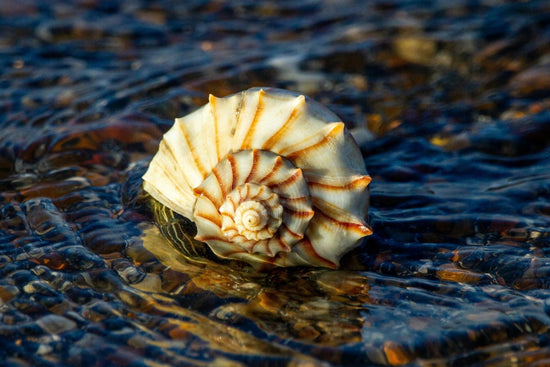Are all-natural skin care products actually good for you, or is this just another green-washed wellness fad designed to grow the market value of the beauty industry? Which ingredients can harm your skin, and how can you swap them out for cleaner options? How does skin care connect to climate change or spirituality? If you’re looking for the answers to any of these questions, you’ve come to the right place.
We started Sea Witch Botanicals with the intention to provide all-natural, non-toxic alternatives to mainstream home and body products that were irritating our bodies and making us sick. We’ve already discussed the dangers of artificial fragrances in depth; now, we’re diving into the world of natural skin care to examine whether it’s really worth the investment and how integrating a little nature into your skin regime can benefit both your body and our planet alike.
In this blog:
- Does Natural Skin Care Really Make a Difference?
- Top Ingredients to Avoid in Skin Care Products
- Top Natural Skin Care Ingredients
- Natural Skin Care Routine
- Resources for Learning More
Please note: The information shared in this blog is not intended to diagnose, treat, or cure any condition, nor should it substitute professional medical advice. Natural skin care is not a one-size-fits-all; each body is different and has its own needs and sensitivities. If you have concerns for your health, please consult your medical practitioner.
Header image by Rodolfo Sanches Carvalho.
Does Natural Skin Care Really Make a Difference?

Photo by Sora Shimazaki.
The natural beauty industry loves to claim that fewer chemicals make a healthier product. While this can certainly be true in some cases, this statement neglects the fact that all organic and non-organic matter is made up of chemicals! They should in no way be inherently feared.
We think this argument is probably trying to get at the fact that certain chemicals are a lot more harmful than others—and such is the case for many of the chemicals used in mainstream, non-natural skin care products. For example, ingredients like parabens, sulfates, and heavy metals are common irritants found in skin care products that can negatively impact the lungs, skin, and other organs or organ systems.
Conversely, products made purely with nature-derived ingredients are more likely to harmonize with your body’s natural biome without the harmful effects. In this same vein, natural skin care products also tend to be more environmentally friendly. They lack harsh chemical preservatives, synthetic fragrance compounds, and other ingredients that can enter our waterways through storm runoff or collect in our soil through waste. Many chemicals in non-natural skin care products can disrupt the ecosystems they land in and threaten local biodiversity—one of our greatest allies for fighting climate change.
At the end of the day, it’s important to remember that everybody’s skin is different. Each of us has different needs, and what works for some may not work for others. Some non-natural products can be extremely useful in treating certain skin conditions, while other issues can be remediated with more familiar, earth-made ingredients.
In general, we Sea Witches believe that living closer to nature, especially through our personal care products, can make a significantly positive impact not just on our bodies, but on our planet, too. However, it’s critical that these products are ethically sourced and sustainably produced.
If you’re looking to try out some natural skin care products, we recommend looking for and supporting businesses like ours that practice ingredient transparency, use waste-conscious packaging, and give back to their communities through organizations like 1% for the Planet or other partnerships.
Top 5 Ingredients to Avoid in Skin Care Products
Many ingredients in mainstream skin care products on the market today might be doing your skin more harm than good. In addition to petroleum-based synthetic fragrances, we’ve already explored irritating ingredients in home and body products at length. Below, learn a little bit about five of the most toxic ingredients you can put on your skin, why they’re harmful, and easy switches you can make.
Parabens

Photo by Lance Reis.
Parabens are a group of compounds used as preservatives in cosmetics. This group includes ingredients like butylparaben, ethylparaben, isobutylparaben, isopropylparaben, methylparaben, propylparaben, 4-hydroxybenzoic acid, and other ingredients ending in -paraben.
According to the Environmental Working Group, “parabens mimic estrogen and can act as potential hormone (endocrine) system disruptors,” which can affect fertility and reproductive function. In skin care, prolonged exposure to parabens can spur allergic reactions or otherwise irritate the skin.
Alternative, safer ingredients to look for include citric acid, hydantoin, potassium sorbate, sorbic acid, or Leucidal, a natural radish root ferment.
Phthalates

Photo by Alesia Kozik.
According to the CDC, “phthalates are a group of aromatic chemicals...used to make plastics more durable.” They are typically used in fragrance compounds and other cosmetic products and act as stabilizers or solvents.
These ingredients are typically called phthalate, butyl benzyl phthalate (BBP) dibutyl phthalate (DBP), diethyl phthalate (DEP), DEHP, or dimethyl phthalate (DMP), and can even be found in artificial fragrances (“fragrance” or “parfum”).
Phthalates are absorbed directly through the skin and are especially well-known for interfering with hormones and links to impaired reproductive function.
Easy switches to make might include essential oil fragrances, all-natural cleansers and moisturizers, or explicitly stated phthalate-free products.
Sulfates and Ethoxylated Ingredients

Photo by cottonbro studio.
Ethoxylated ingredients (like sodium lauryl sulfate) are compounds such as fatty acids or alcohols that have undergone an ethoxylation process, which means they’ve been mixed with ethylene oxide, a gas used to produce things like antifreeze, pesticides, and even sterilizing agents. Unfortunately, ethylene oxide is a cancer-causing substance.
Ethoxylation is convenient for skin care products because it creates surfactants (like detergents) that can bind to and flush out trapped dirt and grime. They also create an even, sudsy lather, which is why they’re a popular ingredient in soaps.
These ingredients are commonly labeled as sodium lauryl sulfate (SLS), sodium laureth sulfate (SLES), polyethylene glycol (PEG), polypropylene glycol (PPG), polysorbate 20, ceteareth-20, steareth-20, glyceryl stearate SE, “-eth-” ingredients, or “-oxynol-” ingredients.
In skin care products, sulfates can irritate or dry out the skin—but there’s a much larger danger lurking in these ingredients. Unfortunately, ethoxylation produces a byproduct called 1,4-dioxane, which is likely carcinogenic to humans.
The Sierra Club writes that this synthetic chemical is linked to liver and kidney damage in addition to multiple forms of cancer. In 2017, the Environmental Working Group found that at least 8,000 skincare products may be contaminated with it.
That makes it particularly important to switch over to sulfate-free, all-natural cleansers instead.
Aluminum

Aluminum is the most abundant metal in the Earth’s crust. It is silvery-white, lightweight, malleable metal that is frequently added to cosmetic products as an astringent and an antibacterial agent. It can be used as an emulsifier or thickener, but it is most commonly known as an active ingredient in antiperspirants.
Aluminum-reliant products like these plug up the sweat glands, which can reduce the body’s ability to regulate its temperature and eliminate toxins or natural, metabolic waste.* Aluminum can also irritate those with sensitive skin and cause rashes, dryness, itchiness, et cetera. That’s why we opt for explicitly aluminum-free skincare products.
Find aluminum labeled as alumina or aluminum oxide, aluminum chloride, aluminum chlorohydrate, aluminum compounds, aluminum hydroxide, aluminum salts, aluminum stearate, aluminum zirconium tetrachlorohydrex glycerine complex, calcium aluminum borosilicate, chrome or chromium alum, potassium alum, soda alum, sodium aluminosilicate, or sodium silver aluminum silicate.
*Note: Minimizing sweat can be helpful for those with conditions that cause them to sweat too much.
Formaldehyde

Photo by Marcelo Moreira.
While formaldehyde might fight bacteria and set back a product’s expiration date, this insidious ingredient is a known human carcinogen that is extremely harmful to human health. Besides being linked to cancer, formaldehyde can also cause allergic reactions or irritate the skin and lungs.
This ingredient is commonly labeled as formaldehyde, formalin, formic aldehyde, methanal, methyl aldehyde, methylene glycol, oxomethane, oxymethylene, or paraformaldehyde.
Unfortunately, formaldehyde is not always an intentional ingredient; it can sometimes be formed or released by the interactions between other chemicals in the product. Ingredients to look out for include DMDM hydantoin, diazolidinyl urea, glyoxal, imidazolidinyl urea, methenamine, polyoxymethylene urea, quaternium-15, sodium hydroxymethylglycinate, 2-bromo-2-nitropropane-1,3-diol, and 5-bromo-5-nitro-1,3 dioxane.
Easy alternatives to formaldehyde can include sorbic acid, potassium sorbate, sodium sorbate, or Leucidal, a natural radish root ferment (and our go-to).
Top 5 Natural Skin Care Ingredients
At Sea Witch Botanicals, we draw on the powers of botanical extracts (like buckthorn, carrot, nettle, and rosehip) and a number of other plant and mineral ingredients to craft our nourishing skin care products. Below, find five of our favorite natural ingredients, why they’re better, and what they’re doing for your skin.
Reishi Mushrooms

The Chinese word for reishi is lingzhi, meaning “divine mushroom” or “herb of spiritual potency.” These mushrooms have been used in traditional Chinese medicine for their general health benefits, particularly for the immune system.
In skin care, reishi mushrooms are used for their anti-aging and anti-inflammatory properties. They moisturize the skin and supply it with necessary antioxidants that help to replenish damage from our environments (such as sunburn or air pollution) on a cellular level.
We use reishi extract in our rejuvenating Lucidum facial oil, named for the marvelous Ganoderma lucidum mushroom itself!
“As a licensed esthetician for over 25 years, I've seen literally hundreds of skin care products (and tested most!). This product exceeded all my expectations…It leaves no residual 'oily' feeling, and my face, neck and décolleté are beautifully moisturized. So glad I purchased this amazing skin care product, one I will keep in my beauty regime for a long long time.”
—Deborah M.
Kaolin Clay

Photo by Laura Ockel.
Kaolin clay is a soft, powdery substance primarily composed of the mineral kaolinite. While it’s famously essential for crafting porcelain and other ceramics, it’s also a great alternative ingredient for natural skin care!
Kaolin clay is a gentle and effective cleanser. It absorbs excess oil and debris, exfoliates, and can assist in healing acne and other topical blemishes.
We use kaolin clay as a basis for our SuperNatural deodorants and soaps, from our ultra-soft artisan soaps to our personal care soaps such as the Sirenium facial bar, Vasheen body and vulva wash, and Roque charcoal grooming soap.
“[Sirenium] is my go-to facial soap! I am 50 and have very dry, sensitive skin that has a tendency towards rosacea. Sirenium is gentle yet cleansing, and has helped keep my rosacea at bay…I've been using it for years, ordering three bars at a time to make sure I never run out. So grateful to the Sea Witch Botanicals team for creating this lovely soap!”
—Jenny D.
Vitamin E

Photo by PNW Production.
Vitamin E is a fat-soluble vitamin found in the skin’s natural oils. As an antioxidant, vitamin E helps to protect and restore cells from environmental damage, especially from UV exposure.
In skin care, vitamin E is a coveted humectant, softening the skin and helping it to retain moisture. It may have some mild anti-inflammatory effects as well, reducing redness and swelling.
We use vitamin E in our Sirenium facial cleanser and Lucidum reishi facial oil as well as our healing Woodland Salve, hydrating EveryBunny lip balm, and dreamy Demeter lotion bar.
[Woodland Salve is] absolutely worth the buy, plus is long-lasting with almost immediate results. Having eczema & psoriasis on my body, this product provided the all-natural relief & healing benefits I desperately needed. Adding the Woodland Salve to my growing list of SWB products I love!
—Chelsea T.
Frankincense

Frankincense is an aromatic resin derived from Boswellia trees that has been used in traditional medicine and spiritual practices around the world for thousands of years. It might be a popular incense ingredient, yet frankincense offers many health benefits, too!
In skin care, frankincense shows promising restorative properties. It is commonly used for anti-aging remedies that strengthen the skin, and to assist in the healing of wounds and scars, especially as an antibacterial ingredient.
In addition to a number of aromatherapeutic essential oil blends, we use frankincense in our Gibbous SuperNatural deodorant, Frith nourishing body soap, hydrating Woodland Salve, and Lucidum reishi facial oil.
I am really enjoying the SuperNatural deodorant. I purchased the Gibbous scent, and it is fresh and goes on smooth. It does not irritate my skin. It lasts all day, even if I exercise. I am thrilled to find a product that works with my sensitive skin and is better for the Earth!
—Lauren S.
Witch Hazel

Photo by Laura Ockel.
Witch hazel is a woody shrub with fragrant yellow flowers. Native to North America, Indigenous peoples such as the Iroquois, Osage, and Potawatami have used it in traditional medicine for centuries.
In skin care, witch hazel is a popular astringent and acne treatment. It is commonly used to treat inflammation and blemishes, balance skin moisture, and relieve burns (particularly from the sun).
In addition to our line of natural room and body sprays, we use witch hazel in our aloe and rosewater-based Veritum soothing facial toner, one of three products in our 3 Step Facial Collection.
This facial toner is my very favorite part of my skin care routine, I spray it on liberally every day! Especially nice in the summer, I work out on the water and my fair skin feels pretty cooked at the end of a hot day and this spray is very refreshing and calming for my face, and it smells great! Highly recommend, I love this product!
—Amanda H.
Natural Skin Care Routine

So, you’re stocking up on natural skin care products, but need some help crafting your new routine. We’ve all been there! Below, the Sea Witch’s recommended natural skin care practice for a bit of inspiration on your healthy skin journey.
Bonus: If you lean toward the witchy side of things, you can use your skin care routine as a bit of magical self-care. Especially when using 100% nature-derived ingredients, your skin care products are already packed with natural magic. You can harness these earthy powers to enhance your routine with an intention, for example, to cleanse and refresh your mental and emotional energy as well as your skin.
Find our 3 Step Facial Collection to save on basic natural skin care necessities crafted with high quality, ethically sourced ingredients.
* * *
Step 1: Cleanse. Using a non-toxic soap, like our organic, shea butter and coconut oil-based Sirenium facial bar, gently lather your face and rub in gentle circles to wash away any dirt and grime that have accumulated on your skin throughout the day. Rinse and pat dry with a clean towel.
Step 2: Purify. Mist your face with an all-natural toner to give your skin an extra-deep cleanse by removing excess oil and preparing your pores for moisturization. We recommend our Veritum facial toner, made with soothing ingredients like aloe, rosewater, and witch hazel.
Step 3: Hydrate. Moisturize your clean skin with a pea-sized amount of your favorite natural hydration serum, lotion, or balm. Try our Lucidum reishi facial oil for a premium, skin-softening lift, or experiment with a little bit of our healing Woodland Salve if you’re on the go.
Don’t leave your lips out! Hydrate that extra-special skin with a swipe of plant-based lip balm, or toss one in your bag for later on. Our Sea Witch vegan lip care comes in a pocket-friendly, recyclable tin. Try EveryBunny for an unflavored, cocoa-butter taste; Mint-to-Be for a zesty, naturally tingly balm; or Starry Night for a luscious star anise experience.
Step 4: Protect. Apply a face-safe sunscreen every morning to protect your skin from exposure to UV rays. We recommend EWG-Verified Babo Botanicals’ mineral sunscreen, reef-safe sunscreen made by Little Hands Hawai’i, or organic, sustainably-produced tallow sunscreen.
If you’re on the verge of getting sick or in close quarters with someone ill, apply a bit of our fortifying Immunity Salve to the back of your neck and pulse points for a bit of plant-powered protection.
Step 5: Refresh. In the morning or after a post-workout afternoon shower, put on a bit of your go-to non-toxic deodorant. For us, that’s our SuperNatural deodorant—an all-natural blend formulated to mix with your natural odor and keep you smelling fresh and delicious. Try our citrus-forward Gibbous scent for a brighter, citrusy aroma, or our earthy Crescent scent to smell like a midnight forest.
Resources for Learning More
Healthy skin care is not a one-size-fits-all! To tailor your routine to your own specific needs, especially when switching over to a natural skin care practice, it’s important to know about popular ingredients on the market and how they affect your skin. We’ve compiled a few resources below to help you learn about how to thrive on your natural skin care journey.
- SkinDeep Database | Environmental Working Group
- The Benefits of Using Natural Products | Learn Canyon
- Ingredients to Avoid in Home and Body Products
- What Is Synthetic Fragrance?
- Everything You Need to Know about Natural Perfumes






2 comments
Informative and well-written! Loved the focus on harmful ingredients, natural alternatives, and the step-by-step skincare routine. Perfect for anyone exploring clean beauty.
Informative and inspiring! A great guide to natural skincare, harmful ingredients to avoid, and eco-friendly alternatives.